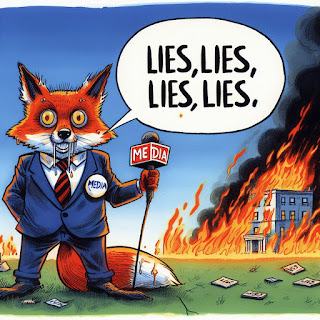Is hell freezing over? Are pigs taking to the sky? Perhaps not, but I do seem to detect a whiff of mea- culpa from the media. There is at least partial acceptance that media has been a cause of our political instability.
First it was Niki Sava asking the question "is the system broken?", and offering a stern denial (see The Australian, Sep 19, 2015,
Yes, we’re not a banana republic, and no, the system ain’t broke).
Then came Paul Kelly, with his forthright, but gentlemanly rebuttal of Sava (see The Australian, Sep 23 2015,
Negative politics the biggest enemy of reform). Yes, our political system is broken. Yes, this is having a negative impact on our society. By our media's focus on the negatives our politicians are busy fighting fires and as a consequence have deferred reform for virtually a decade. Yes, the media are at least partially at fault, by their unedifying emphasis on the trivial while ignoring the significant.
Today, we have Troy Bramston on the same topic and building on Kelly's arguments (see The Australian, Sep 28,2015,
Revolving-door PMs not healthy for the nation).
"Clearly, we have a problem. As Paul Kelly wrote last week, we have had a revolving-door prime ministership, countless ministers and no substantial economic reforms since 2004. As a result, our living standards are declining. Poor performing leaders are always going to be vulnerable but this level of instability is affecting our economy and society."
Troy Bramston, Revolving-door PMs not healthy for the nation
While Troy steers a kindly middle of the road, in the main, he has put forward a couple of suggestions which could alleviate the problem. He notes that there are too many polls, that parliamentary terms should be increased and that the Liberal party could take a leaf from the ALP and change the rules relating to party spills. These are constructive contributions that could provide greater stability. Although I don't know how you could prevent a pollster from producing a poll.
But as the others before him, the focus on the media is superficial. There is no attempt at identifying the media culture that is the root cause of the negative reporting. The culture that treats the trivial on equal terms as the substantial, the culture that seeks out foibles and slip ups. The culture that looks for gotcha moments, with aggressive interviewing tactics. The culture that worships moments of anguish by interview victims.
I have written about this before (see
Interviewing:boxing or surgery?,
Mischievous media magnifies mayhem,
Raising the standard of public broadcasting ) I guess it is one of my 'bug-bears'.
I believe our media culture has a vital role in our society. It has a direct impact on our political and economic system, as evidenced by the political instability now acknowledged by Kelly and Bramston.
However its influence goes beyond that. Our media enters our homes, and becomes part of our daily life. Whether they intend it or not, our media set an example for all our behaviour. How we interact with our colleagues, our friends, or the man in the street. By their interactions on the radio and our TV screens we learn that it is okay to shout down those with whom we disagree. It is ok to laugh at others' discomfort. It is okay to ridicule and make fun of foibles.
But it isn't. And I am sure that the Leigh Sales's, Emma Albericis and the various Jones's of our media, indeed all our commentators, do not believe that their behaviour should be taken into our daily lives. I am sure they believe they are doing their professional duty as journalists. Even if they interrupt or talk over the interviewee, or ask questions with aggression and malice, or indeed focus on the trivial, such as winks or flags, they believe these behaviours are justified in the quest for truth. Their role as noble guardians of our society somehow justifies such transgressions of respectful discourse. Alas these are but empty rationalisations. There are many examples where journalists, despite their common role as 'noble guardians', manage to maintain higher standards than many in our media (see
Raising the standard of public broadcasting).
I suggest, however, our journalists, particularly our radio and TV presenters, should think more about their audience. They should visualise their audience as impressionable youngsters or indeed their own children. Is this the way they would want their children to behave, or indeed is this the way they would want their children to see them behave? I suggest this perspective may encourage them to tone down and fulfil their role with greater professionalism.


